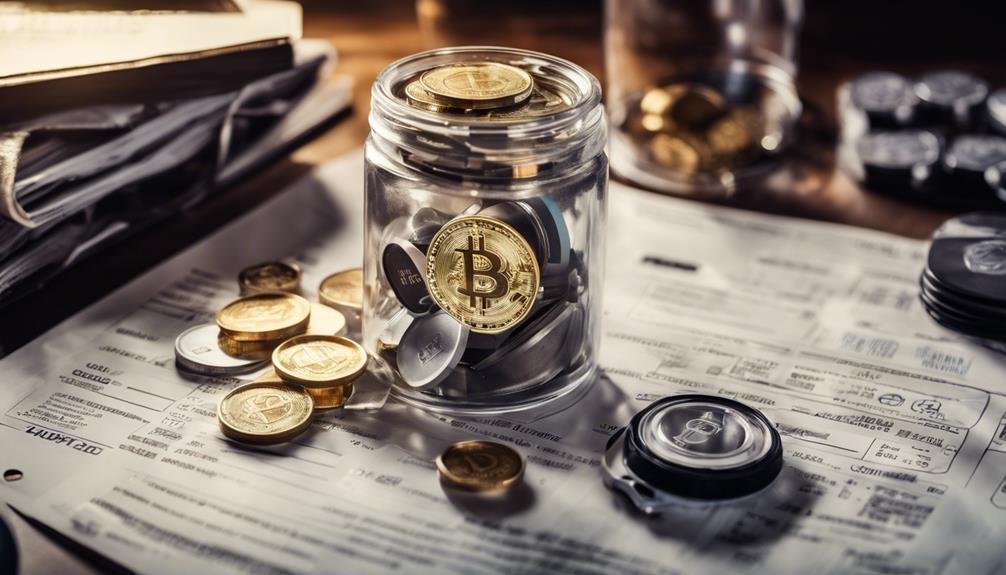Mastering crypto tokenization compliance is important for the legitimacy and viability of digital assets, as regulatory non-compliance can lead to severe penalties, reputational damage, and financial losses. Understanding the evolving regulatory landscape, including key bodies such as the SEC and CFTC, is essential. Compliance best practices include conducting thorough research, engaging legal experts, and implementing robust AML and KYC protocols. Effective risk management strategies, internal controls, and transparency are also significant. As regulatory frameworks continue to evolve, staying informed and adaptable is key to maneuvering the complex world of crypto tokenization compliance, and a deeper exploration of these topics can provide valuable insights.
Table of Contents
Brief Overview of Best Practices For Crypto Tokenization Compliance
- Conduct thorough research on local regulatory environments to ensure informed compliance in crypto tokenization.
- Implement robust KYC and AML protocols to prevent illicit activities and maintain legitimacy.
- Engage legal and regulatory experts for guidance on navigating complex compliance frameworks.
- Establish a risk assessment framework and internal controls to mitigate risks and ensure accountability.
Understanding Crypto Regulations
As the crypto tokenization landscape continues to evolve, understanding the complex and often varying regulatory frameworks that govern cryptocurrencies is vital for guaranteeing compliance and avoiding potential pitfalls. Regulatory compliance is a significant aspect of the tokenization process, as it directly impacts the legitimacy and viability of digital assets. Key regulatory bodies, such as the SEC and CFTC in the U.S., assess whether tokens qualify as securities, subjecting them to stringent securities laws and compliance requirements.
To guarantee regulatory compliance, businesses involved in tokenization must implement Anti-Money Laundering (AML) and Know Your Customer (KYC) protocols, which aim to prevent illicit activities and guarantee the legitimacy of transactions. These protocols are particularly important for security tokens, which are subject to regulations regarding their issuance, trading, and custody.
Non-compliance with cryptocurrency regulations can lead to severe consequences, including hefty fines and legal actions. Consequently, it is vital to understand the regulatory landscape and adhere to applicable laws to guarantee the success and sustainability of tokenization projects. By prioritizing regulatory compliance, businesses can navigate the complex tokenization process with confidence and mitigate potential risks.
Global Regulatory Frameworks
The regulatory landscape for tokenization is characterized by varying degrees of complexity and stringency across different regions, with each jurisdiction implementing its unique framework to govern the creation, issuance, and trading of digital assets. The European Union’s Markets in Crypto-Assets (MiCA) regulation aims to create a harmonized framework, while the United States’ SEC classification of certain tokens as securities influences compliance requirements, emphasizing Know-Your-Customer (KYC) and Anti-Money Laundering (AML) protocols for token offerings.
Asia presents a mixed environment, with Singapore embracing a tech-friendly approach and China imposing strict bans on cryptocurrency activities. The Cayman Islands offer a compliance-friendly environment, attracting businesses involved in tokenization. Globally, regulatory bodies focus on consumer protection and financial stability, anticipating changes in compliance frameworks as the market matures.
Understanding these global regulatory frameworks is vital for maneuvering the complexities of tokenization and ensuring compliance with varying regulatory requirements. As the regulatory landscape continues to evolve, staying informed about the latest developments and adapting to changes is essential for success in the tokenization space.
Compliance Best Practices

For tokenization projects to maneuver the intricate regulatory landscape effectively, adherence to established compliance best practices is paramount. To guarantee seamless compliance, it is essential to conduct thorough research on local regulatory environments and stay updated on changes to evolving laws related to crypto tokenization. Engaging legal and regulatory experts is also essential to guide compliance efforts, particularly regarding Anti-Money Laundering (AML) and Know Your Customer (KYC) protocols, which are often mandatory for token sales.
Documenting all compliance efforts meticulously, including transaction records and internal controls, is fundamental to prepare for potential audits or inquiries from regulatory bodies. Regular audits and ongoing employee training programs should be implemented to reinforce compliance knowledge and adherence to regulations in the tokenization process. Maintaining transparent communication with regulatory bodies is also key to align tokenization projects with legislative expectations, thereby avoiding potential fines or legal action for non-compliance.
By following these best practices, tokenization projects can guarantee compliance with regulatory requirements, minimizing risks and ensuring successful token sales. Effective compliance strategies are integral to the success of tokenization projects, and adherence to these best practices is essential to maneuvering the complex regulatory landscape.
Regulatory Challenges Ahead
Maneuvering the complex regulatory landscape of crypto tokenization poses significant challenges, particularly in jurisdictions where varying interpretations of securities laws and evolving technology create compliance uncertainty. The rapid evolution of tokenization technology often outpaces existing regulatory frameworks, resulting in gaps that can lead to non-compliance risks for businesses operating in multiple jurisdictions. For instance, the U.S. Securities and Exchange Commission (SEC) determines if a token qualifies as a security, impacting its compliance requirements.
Different countries impose distinct Anti-Money Laundering (AML) and Know-Your-Customer (KYC) requirements, complicating compliance for tokenized asset offerings and increasing operational costs for businesses. Regulatory uncertainty, particularly in major markets like the U.S. and EU, can deter investment and innovation in tokenization projects, as companies grapple with the potential for enforcement actions and penalties.
The emergence of decentralized finance (DeFi) platforms introduces additional regulatory challenges, as traditional compliance models struggle to adapt to the decentralized nature of tokenized assets and their trading mechanisms. These regulatory challenges underscore the need for businesses to stay informed and adaptable in the face of evolving tokenization regulations.
Risk Management Strategies

Effective risk management is paramount in maneuvering the complex regulatory landscape of crypto tokenization, as it enables businesses to proactively address compliance challenges and mitigate potential risks associated with tokenized asset offerings. To achieve this, companies must establish a robust risk assessment framework tailored to digital assets, identifying potential compliance risks associated with tokenization processes and operations.
Key risk management strategies include:
- Implementing robust internal controls, such as segregation of duties and access controls, to mitigate risks and guarantee accountability within the tokenization workflow
- Regularly updating risk management strategies to adapt to evolving regulatory changes, including emerging regulations on stablecoins and DeFi platforms
- Developing incident response plans to address compliance breaches swiftly, minimizing potential legal and financial repercussions
Navigating Jurisdictional Laws
Across the globe, jurisdictional laws governing crypto tokenization exhibit significant variability, with some countries fostering innovation through supportive regulatory frameworks while others impose stringent requirements. For instance, the U.S. SEC‘s classification of tokens as securities has created a complex regulatory environment, whereas the European Union‘s MiCA regulation aims to harmonize token regulations across member states. Countries like Singapore and Japan have established favorable regulatory environments, encouraging innovation and investment in digital assets.
To navigate these jurisdictional laws, businesses must prioritize compliance with local Anti-Money Laundering (AML) and Know Your Customer (KYC) laws. Implementing these measures is vital to prevent illicit activities and guarantee the legitimacy of token holders. A thorough understanding of the regulatory framework in each jurisdiction is essential to avoid non-compliance, which can result in severe penalties.
Tokenization platforms must stay informed about evolving jurisdictional laws and engage legal experts to navigate the complexities of compliance. By doing so, businesses can guarantee the integrity of their tokenization processes and maintain the trust of their token holders. Effective compliance with jurisdictional laws is fundamental to the success of tokenization initiatives in the rapidly changing global regulatory landscape.
Ensuring Transparency Compliance

As businesses navigate the complexities of jurisdictional laws, a complementary aspect of compliance emerges in the form of transparency, which is equally essential for maintaining trust and legitimacy in the tokenization process. Transparency compliance involves clear disclosure of token economics, including total supply, allocation, and use of funds. This guarantees that potential investors are well-informed about the project’s financial structure.
Key aspects of transparency compliance include:
- Implementing robust KYC (Know Your Customer) and AML (Anti-Money Laundering) protocols to verify participants and guarantee legitimate funds
- Utilizing blockchain technology to provide immutable records of transactions and token distributions
- Engaging with regulatory bodies and following established guidelines to demonstrate adherence to legal standards
Implementing Effective Controls
Implementing robust internal controls is a significant component of crypto tokenization compliance, requiring a multifaceted approach that addresses risks, guarantees accountability, and maintains regulatory adherence. Effective controls are essential for safeguarding the integrity of crypto operations and mitigating potential risks. To achieve this, it is imperative to establish segregation of duties, preventing any single individual from having too much control over tokenization processes. Regular security audits and compliance checks are also necessary to identify and mitigate risks, guaranteeing adherence to regulatory requirements.
In addition, implementing automated monitoring systems can enhance transaction tracking and reporting, facilitating timely detection of suspicious activities. Documenting compliance procedures and maintaining accurate records are also crucial for preparing for potential audits or regulatory inquiries. Moreover, continuous employee training and awareness programs on compliance issues guarantee that staff are informed about current regulations and internal controls related to tokenization.
By implementing these effective controls, organizations can make certain that their crypto tokenization operations are compliant with regulatory requirements, minimizing the risk of non-compliance and associated penalties. This, in turn, helps to maintain stakeholder trust and confidence in the organization’s crypto operations.
Managing Compliance Risks

Establishing effective internal controls is a fundamental aspect of crypto tokenization compliance, but it is equally important to proactively manage compliance risks that can arise from various aspects of tokenization operations. Compliance risks can have severe consequences, including reputational damage, financial penalties, and loss of business.
To manage compliance risks effectively, consider the following key strategies:
- Conduct regular risk assessments to identify potential compliance risks related to tokenization, ensuring alignment with evolving regulatory standards and practices.
- Implement robust internal controls, such as segregation of duties and access controls, to mitigate risks associated with unauthorized transactions and data breaches in token management.
- Utilize advanced technology solutions for transaction monitoring and reporting, enabling real-time detection of suspicious activities that may indicate compliance breaches.
Staying Ahead of Regulations
Numerous regulatory hurdles must be cleared by businesses engaging in crypto tokenization, necessitating a proactive approach to staying ahead of evolving regulatory landscapes and guaranteeing compliance with an increasingly complex web of laws and guidelines. Understanding the differences between security tokens and utility tokens is essential, as security tokens are regulated under securities laws while utility tokens may face less stringent regulations depending on their use case.
To maintain compliance, businesses must engage in ongoing research into local regulatory environments and stay updated on changes. Compliance with Know-Your-Customer (KYC) protocols is also mandatory for businesses dealing in cryptocurrencies, verifying that they confirm the identities of their clients to prevent fraud and illegal activities. In addition, adherence to Anti-Money Laundering (AML) laws is necessary to prevent the misuse of cryptocurrency.
Engaging legal and regulatory experts can provide valuable guidance in traversing the complex landscape of crypto regulations. Additionally, staying informed about tax frameworks and their evolution to accommodate cryptocurrency transactions is imperative for businesses to adapt their practices and guarantee compliance. By staying ahead of regulations, businesses can minimize the risk of non-compliance and maximize the benefits of tokenization.
Future of Crypto Compliance

As the cryptocurrency market continues to mature, the future of crypto compliance is poised to be shaped by the convergence of technological innovation, international cooperation, and evolving regulatory priorities. The maturation of the market is expected to bring about standardized global regulations, promoting uniformity across jurisdictions. This, in turn, will enhance the effectiveness of compliance measures, including Anti-Money Laundering (AML) and Know Your Customer (KYC) protocols.
The future of crypto compliance will likely be characterized by:
- Increased collaboration among international regulatory bodies to address cross-border issues and promote consistent regulatory norms.
- The emergence of regulatory sandboxes as a mechanism to encourage innovation in the crypto space while guaranteeing adherence to compliance standards.
- A growing emphasis on consumer protection and financial stability, influencing regulatory discussions and shaping future compliance frameworks.
As tokenization continues to gain traction, it is essential for industry stakeholders to stay informed about the evolving regulatory landscape and adapt their compliance measures accordingly. By doing so, they can guarantee the integrity and stability of the crypto market, ultimately promoting consumer trust and confidence.
Frequently Asked Questions
What Is the Basics of Tokenization?
Tokenization represents the digital transformation of assets into blockchain-based tokens, offering advantages such as increased liquidity and fractional ownership, while encompassing various token types, smart contracts, and adherence to legal regulations, benefiting investors with enhanced security measures.
Which Crypto Is Best for Tokenization?
When evaluating the best crypto for tokenization, consider industry use cases, regulatory challenges, and market trends. Ethereum, Binance Smart Chain, and Solana are top contenders, offering unique tokenization benefits, investment strategies, and technological innovations that shape future predictions.
What Is Distribution in Cryptocurrency?
Distribution in cryptocurrency refers to the allocation of tokens among stakeholders, influencing market impact, investor protection, and liquidity. Effective token distribution models, such as pre-sales and airdrops, require compliance strategies to navigate regulatory frameworks and mitigate liquidity challenges.
What Are Tokenized Assets?
Tokenized assets represent digital ownership of real-world assets on a blockchain, enhancing asset liquidity and investment opportunities through fractional ownership and security tokens, while maneuvering regulatory challenges and market volatility.
Summarizing
Effective crypto tokenization compliance necessitates a multifaceted approach, integrating regulatory understanding, best practices, and risk management strategies. Implementing robust controls and staying abreast of evolving regulations are vital for mitigating compliance risks. As the crypto landscape continues to mature, adherence to regulatory frameworks will remain paramount. Ongoing vigilance and adaptability will be essential for maneuvering the complex and dynamic environment of crypto tokenization compliance. Regulatory clarity and standardization will be key to future growth and adoption.




